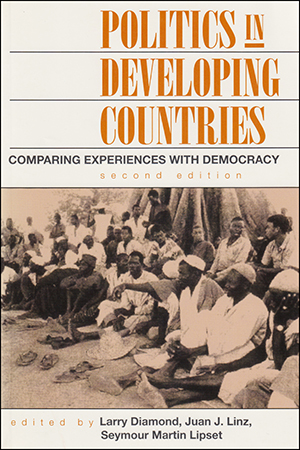This second edition of the highly regarded Politics in Developing Countries again presents case studies of experiences with democracy in Asia, Africa, Latin America, and the Middle East, along with the editors' synthesis of the factors that facilitate and obstruct the development of democracy around the world. The new edition adds a chapter on South Africa and brings the other nine studies current through 1994.
The recent developments covered in the book include:
- the reemergence of democratic politics in Chile
- the impeachment of President Collor and the crisis of democracy in Brazil
- the growing pressure for substantive democratization in Mexico
- the 1994 elections in Chile, Brazil, and Mexico
- the leadership transition in Turkey following the death of President Ozal
- the growing ethnic and religious strife in India
- the overthrow and reemergence of democracy in Thailand and the country's economic boom
- the quest for democratic consolidation in South Korea under new President Kim Young Sam
- the political and economic crisis in Nigeria
- the difficulties facing the one-party dominant regime in Senegal following the 1993 elections
- the 1994 elections and democratic transition in South Africa
Larry Diamond is senior research fellow at the Hoover Institution. He is author of Class, Ethnicity and Democracy in Nigeria: The Failure of the First Republic and coeditor, with Juan J. Linz and Seymour Martin Lipset, of Democracy in Developing Countries (4 vols.). Juan J. Linz is Sterling Professor of Political and Social Science at Yale University. He has written widely on authoritarianism and totalitariansim, fascism, and transitions to democracy and is coeditor of the four-volume work The Breakdown of Democratic Regimes. Seymour Martin Lipset holds the Hazel Chair of Public Policy at George Mason University. Among his books are Political Man, The First New Nation, and Consensus and Conflict.
"The quality is uniformly high, and the reader will find each of the individual contributions rewarding. Moreover...there is a conscious and largely successful effort to structure the chapters in accordance with the editors’ thematic outline."—John D. Martz, Studies in Comparative International Development
"First-rate volume ... arrives at an appropriately nuanced assessment of the prospects of democracy in developing countries.... Besides speaking to a crucial theoretical question, the book provides thorough, informative, and up-to-date overviews of the political development of ten important developing countries.... this important, strong volume deserves a wide audience."—The Journal of Asian Studies
From the reviews of the first edition:
"Much food for thought and discussion. . . . The scholar, the student, and the practitioner will all find something useful in this publication."—Journal of Developing Areas
"Brilliantly synthesizes various difficult topics in comparative political development and democracy."—Choice






